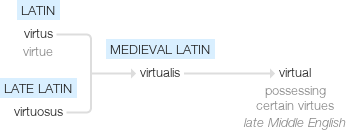Virtual Nature
a definition of virtual
virtual
ˈvəːtʃʊ(ə)l,ˈvəːtjʊəl/Submit
adjective
adjective: virtual
- almost or nearly as described, but not completely or according to strict definition.
“the virtual absence of border controls”
synonyms: effective, in effect, near, near enough, essential, practical, for all practical
purposes, to all intents and purposes, in all but name, indirect, implied, implicit,
unacknowledged, tacit1
“we drove to the cottage in virtual silence”- COMPUTING
not physically existing as such but made by software to appear to do so.
“virtual images”
carried out, accessed, or stored by means of a computer, especially over a network.
“a virtual library”- OPTICS
relating to the points at which rays would meet if produced backwards.- MECHANICS
relating to or denoting infinitesimal displacements of a point in a system.- PHYSICS
denoting particles or interactions with extremely short lifetimes and (owing to the uncertainty
principle) indefinitely great energies, postulated as intermediates in some processes.
Origin
late Middle English (also in the sense ‘possessing certain virtues’): from medieval Latin
virtualis, from Latin virtus ‘virtue’, suggested by late Latin virtuosus .
footnotes
1tacit
ˈtasɪt/Submit
adjective
adjective: tacit
understood or implied without being stated.
“your silence may be taken to mean tacit agreement”
synonyms: implicit, understood, implied, inferred, hinted, suggested, insinuated;
unspoken, unstated, undeclared, unsaid, unexpressed, unmentioned, unvoiced, silent,
mute, wordless, not spelt out; taken for granted, taken as read
“the bargaining relies on informal agreements and tacit understandings”
antonyms: explicit, stated
Origin
early 17th century (in the sense ‘wordless, noiseless’): from Latin tacitus2,
past participle of tacere ‘be silent’.
2Tacitus
Historian Publius Cornelius Tacitus
was a senator and a historian of the Roman Empire.
The surviving portions of his two major works—the Annals and the Histories -
examine the reigns of the Roman emperors Tiberius, Claudius, Nero, and those
who reigned in the Year of the Four Emperors (69 AD). These two works span
the history of the Roman Empire from the death of Augustus, in 14 AD, to the
years of the First Jewish–Roman War, in 70 AD. There are substantial lacunae
in the surviving texts, including a gap in the Annals that is four books long.
Born: 58 AD
Died: 120 AD, Roman Empire
Genre: History
Subject: HistoryQuotes
The more corrupt the state, the more numerous the laws.
To plunder, to slaughter, to steal, these things they misname empire; and where they make a
wilderness, they call it peace.
The desire for safety stands against every great and noble enterprise.Books
Annals Histories Germania Agricola Dialogus de oratoribus
Navigation Cultivated Dream Landscape About

